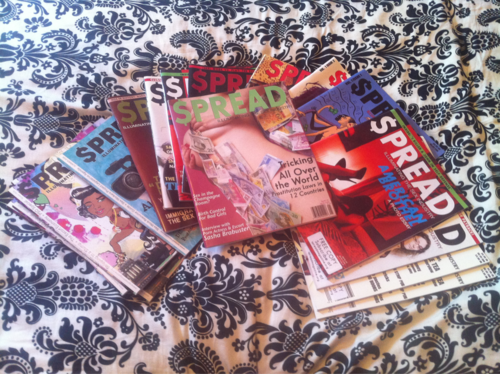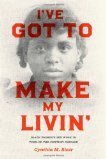Audacia Ray's Blog, page 48
July 16, 2011
So green! Homemade pesto over orzo and grilled chicken, green...
July 15, 2011
Amazing ad for rentboy.
Best tagline ever: "Money...
workingsex:
Official flyer for my film. I'm going to try to...

Official flyer for my film. I'm going to try to post them on as many public spaces in Seattle as possible. If you want to become involved, let me know. :)
Excited to see the progress of this project, and this kind of conversation and support more generally.


Limericks by Sam Steward, at the Museum of Sex.
(My review of...

Limericks by Sam Steward, at the Museum of Sex.
(My review of Secret Historian: The Life and Times of Samuel Steward, Professor, Tattoo Artist, and Sexual Renegade, the excellent biography of Steward, is here.)


July 14, 2011
This year, at the Speak Up! Media Training that Red Umbrella...
This year, at the Speak Up! Media Training that Red Umbrella Project / Sex Work Awareness did back in April, participants contributed to growing the I Am A Sex Worker public service announcement - and here's the result. Please share it, screen it at events as a conversation-starter, talk about it, et cetera. It's a tiny contribution toward the behemoth task of humanizing sex workers. (It also debuts the new Red Umbrella Project logo - fuller identity design revamp is on its way).
And now I want to use this post to deconstruct the phrases "sex work" and "sex workers."
"Sex work" is a politicized phrase, one that has been very important in our movement since it was coined in late 1970s. It's now a widely used phrase - activists have used it enough and advocated for this phrase enough that the United Nations uses it. Journalists sort of use it - though usually editors write slangy puns for headlines, the phrase shows up in articles more and more. "Sex work," especially in the international context, has aligned our movement with labor rights and has been used as a tool against the stigmatization and disrespect that sex workers face in civil society and in legal and health institutions big and small. Today, the commitment to the political understanding that sex work is work is a major underpinning of the international sex worker rights movement. That phrase is part of the push to legitimize sex work as a form of labor that people engage in, by choice and circumstance, to make a living.
"Sex worker" is (obviously) a related term, used to mean a person who exchanges their own erotic labor for money, goods, or services. In the North American context, the phrase is an umbrella term, which means that sex workers don't necessarily have genital contact with anyone, and they can include prostitutes, porn performers, phone sex operators, fetish workers, exotic dancers, and many others. In the international policy context, sex workers refers to people who exchange physical sexual acts. A lot of this has to do with the fact that international policy that affects sex workers is Last week GOOD magazine published a piece called Whore, Prostitute, Hooker, or Sex Worker: What Would You Say? and Melissa Gira Grant wrote Why did I call them "prostitutes"? Both are worth reading to get a feel of the current state of the discussion around these words (in short: confused and nuanced, respectively).
In North America, the gap I see ever widening is between people who adopt the phrase "sex worker" to identify themselves and align themselves with the movement, and people who would never use this identity phrase but do or have done transactional sex. The gap has a lot to do with privilege: people showing their faces and publicly identifying as sex workers are most frequently white, able bodied, cisgender, middle class, educated, and sometimes also retired from sex work. Yes, I've just described myself, and many of the folks who are likewise visible and outspoken are a lot like me. See the above video, or also Furry Girl's new project SWAAY (though she's really focused on having current sex workers represent).
I've been slowly steering myself away from using the phrase "sex workers", because more and more I am seeing these divides and I'm listening more deeply to the language other groups use - and it's significant that they are using different words. In a response to a Colorlines article on sex trafficking, an affiliate of the INCITE! collective kicks off with this paragraph:
As a collective of radical women and queer people of color and Indigenous people who identify as sex workers, people in the sex trades, people doing what we have to do to survive, and people who have been trafficked into sex work and other forms of labor, we wanted to respond to Rinku Sen's recent Colorlines blog post The Complexities of Sex Trafficking, and Some Simple Solutions because, for us, there are no simple solutions to the complex circumstances that inform our lives. Simplified responses do not do justice to our lived realities, or to the systemic conditions that inform them. While we appreciate Sen's distinction between trade and trafficking, unfortunately this distinction is not made within the laws currently being promoted to respond to harms experienced by people in the sex trades. In fact we believe that in all too many cases these laws increase harm to the very people they intend to help.
Other phrases I'm seeing include:
people who exchange sex for something they need (HIPS uses this one)
transactional sex
something for something love (see this campaign by a youth org in Uganda)
experience in street and informal economies (YWEP uses this, and it can also be inclusive of people who use drugs)
There are certainly more. Any other phrases you've been seeing?
I don't think that "sex work" and "sex worker" have outlived their usefulness as terms, but I do think its important to consider the impact of the language we use and really listen to how other people frame their conversations around this challenging issue. The fact remains that not all people who do transactional sex call themselves sex workers. Many people don't have language for it at all, or they would prefer not to think about it as an identity, but rather as a thing they do. Though everyone who tangles with sex, money, and survival should be welcomed under the big red umbrella, calling people by a name they don't embrace is problematic, disrespectful, and could put them at risk of harm.
Whew, that's a lot to chew on. Let me leave you with this: last October, the lovely Ducky Doolittle performed at the Red Umbrella Diaries, and in her story she talked a little about resisting the identity of sex worker. For many other reasons as well, her story is well worth a listen. It's called "Dominoes and Backbone" - click to listen.


vintagegal:
Pin-ups protest for more money 1940's
oh, I would...

Pin-ups protest for more money 1940's
oh, I would really love to know more about this image. anyone?
(also: sex work activism lends itself to the best, punniest signs ever. if you like puns. which I do. a lot.)


"One year from the International AIDS Conference in Washington, D.C., prospects are looking dim for..."
One year from the International AIDS Conference in Washington, D.C., prospects are looking dim for sex workers and drug users who want to attend.
Strict U.S. regulations that block entry for people who admit to sex work or drug use could keep hundreds from participating in the world's largest gathering on HIV/AIDS. Recognizing the key role these individuals play in charting the future of the fight against the disease, the IAS formed a working group to troubleshoot avenues for getting marginalized groups into the country.
"- Housing Works: IAC 2012: No Progress on Visas for Drug Users or Sex Workers


July 13, 2011
"Why aren't more campaigners against prostitution and slavery concerned when women resist rescue? Is..."
- Women resist rescue by anti-trafficking police, who admit it | The Naked Anthropologist


July 12, 2011
Do you want copies of $pread magazine to distribute to sex...

Do you want copies of $pread magazine to distribute to sex workers in your community? I just sent 160 of them to estringsgstrings for the price of shipping - which totaled a little less than $60. Message me and I'd be happy to send you some as well. I have hundreds, and want them to be in sex workers hands, not in my bedroom. Fun fact about this pic: the mag in the middle, issue 2.1, features me on the cover. I was art directing the cover shoot and the model didn't show, soooo… There I am. The most fun part of that shoot, though, was walking into a currency exchange in NYC and saying "give me one of everything." And then returning the money after the shoot.


Review: I've Got to Make My Livin'
 I've Got to Make My Livin': Black Women's Sex Work in Turn-of-the-Century Chicago by Cynthia M. Blair
I've Got to Make My Livin': Black Women's Sex Work in Turn-of-the-Century Chicago by Cynthia M. Blair
My rating: 4 of 5 stars
Groundbreaking historical analysis of black sex working cis women in the late nineteenth and early twentieth century in Chicago. Very thorough with lots of careful citations. And a very interesting compliment to Timothy Gilfoyle's City of Eros - where Gilfoyle mentions black sex workers in passing, Blair digs in deeper, plus does some analysis of why black women have been passed over in the historical record. I hope this is the start of a new scholarship that examines race and the sex trade in a complex way, both in historical and contemporary contexts.
A note on style - whoa, it's been a while since I've read an academic tome. I definitely struggled through some sections of this (relatively short) book - especially having just come out of reading The Warmth of Other Suns, which has a narrative take on a similar time period in Chicago. I felt like this book filled in some of the gaps about labor, survival, and respectability that The Warmth of Other Suns neglected (that book doesn't discuss sex work in a meaningful way), definitely an interesting pairing. And though I know this is a scholarly text, I kept wondering what this book would look like it if was written more in narrative form.
View all my reviews and reading on Goodreads









